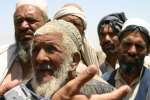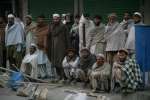- Text size
 |
|  |
|  |
| 
- عربي
Afghan refugee defies oppression with paint
News Stories, 26 November 2015
ISLAMABAD, Nov 26 2015, Pakistan (UNHCR) – Every stroke of Manizha's brush tells a story. Through her art, hundreds of women have been given a voice, a chance to speak out about their harrowing experiences of life under the Taliban.
But each painting reminds Manizha, a 26-year-old Afghan refugee, of her own struggle, which began in 1997 when she and her family were forced to flee Kabul.
Even now, she can still remember the family's desperate break for the border. "En route to Pakistan our van was stopped by the Taliban," she says. "They searched our belongings, took all our family photos out and [set fire] to them, saying, 'It's forbidden'. A cold shiver still runs down my spine when I think of that moment and recall their ferocious faces."
After the family found safety in Pakistan, then eight-year-old Manizha had the chance to attend school for the first time in her life. She quickly rose to the top of the class and even began funding her own studies.
But, as the years went by, a sense of despair that Manizha felt in exile only increased. "I was angry at the treatment of Afghan women," she says. "I was sad about the war in my country and I had so much going on inside my head which I wanted to vent through writing, but I did not have enough money to get admission to a university master's degree programme."
In time, she turned to art, and decided to focus instead on drawing lessons. Her paintings were so compelling that her first two were sold on the second day of an exhibition, giving her the confidence to carry on.
Today, Manizha is working on a series of nine paintings called 'The Untold Narrative' about the suppression of Afghan women under the Taliban. She works on canvas with oil paints, acrylics and charcoal. Each painting focuses on her main character's struggle, which according to Manizha may not otherwise have ever been heard.
"When I meet brilliant refugee youth like Manizha I see a more promising future for Afghanistan in them," remarks Indrika Ratwatte, UNHCR's representative in Pakistan.
In a country where children and young people constitute nearly 70 percent of the Afghan refugee population, Ratwatte recognizes the importance of Manizha's work.
"With one of the youngest populations in the world, residing both in and outside of the country, investing in empowering Afghan youth with education and skills to ensure the sustainable reintegration of these youngsters is imperative," he says.
Like so many Afghan refugees living in Pakistan, Manizha dreams of one-day returning home. There, she hopes to exhibit her work and share the skills and techniques she has learned in Pakistan.
"Pakistani art is amazing and diverse," she says with excitement. "Art is like the global language of communication where colours speak for you and everyone understands it. I want to promote peace and harmony through my work and I wish one day Pakistani artists could also go to Afghanistan and showcase their work."
By Duniya Aslam Khan, Islamabad
















































